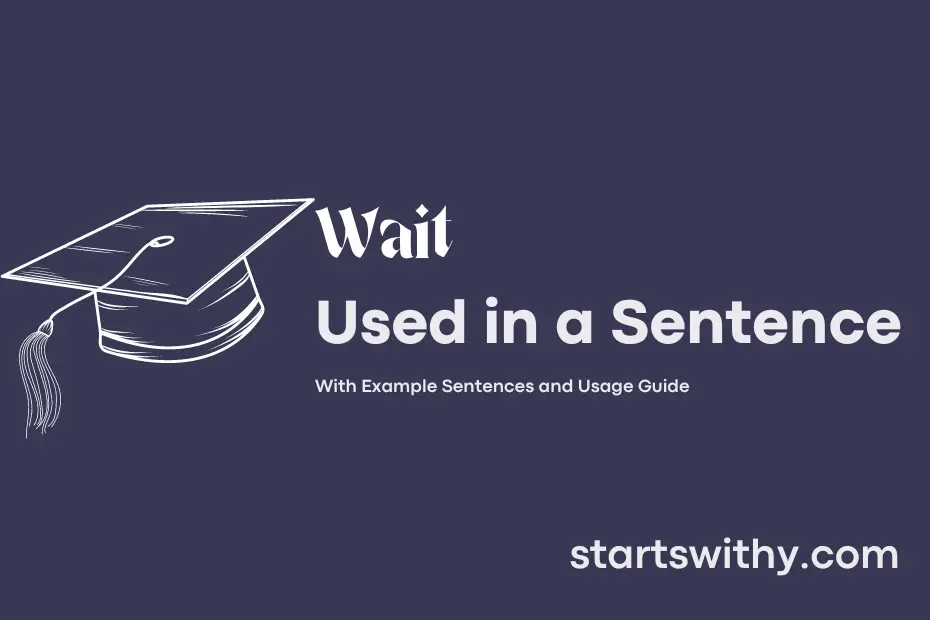Have you ever found yourself in a situation where you had to pause and hold off on taking action for a moment? This act of temporarily delaying or pausing before proceeding can be described as waiting. Whether it’s waiting in line at a store, waiting for a response in a conversation, or waiting for a special event to happen, waiting is a common part of our daily lives.
During periods of waiting, emotions such as patience, anticipation, frustration, or excitement can arise. While waiting can sometimes feel like a waste of time, it also offers opportunities for reflection, relaxation, and mindfulness. Understanding the significance of waiting in various contexts can provide valuable insights into the human experience.
7 Examples Of Wait Used In a Sentence For Kids
- Wait for your turn to speak in class.
- Can you wait patiently in line?
- Let’s wait for our friends before we start playing.
- Remember to wait for the teacher’s instructions.
- It’s important to wait for the traffic signal before crossing the road.
- Ask politely if you need to wait for help.
- Always wait for permission before leaving the classroom.
14 Sentences with Wait Examples
- Wait for the professor to finish the lecture before asking any questions.
- Wait until the library opens to borrow the reference book you need.
- Make sure to wait for your turn to speak during group discussions.
- Don’t leave for the exam hall, be sure to wait for your classmates to join you.
- Wait a few more minutes for the cafeteria to restock the food items.
- Wait until the end of the semester to see your final grades.
- Wait in line to submit your assignment before the deadline.
- Before leaving for the college fest, remember to wait for your friends.
- Don’t rush, take a moment to wait for the elevator to arrive.
- Wait for the guest lecturer to arrive before beginning the seminar.
- It’s polite to wait for everyone to arrive before starting a group project meeting.
- Ensure you wait for your academic advisor’s response before making any changes to your course schedule.
- Wait for your friend to finish using the computer before checking your emails.
- Remember to wait for your college bus at the designated stop.
How To Use Wait in Sentences?
To use “Wait” in a sentence, follow these simple steps:
- Identify the context: Determine when it is appropriate to use the word “Wait”. It usually pertains to asking someone to pause or delay action.
- Form a complete sentence: Start by constructing a sentence that includes the word “Wait” in it. For example, “Please wait for me at the entrance.”
- Ensure clarity: Make sure that the sentence clearly conveys the message you want to communicate. Avoid any unnecessary complexity.
- Correct punctuation: Use appropriate punctuation marks such as a comma or exclamation point to enhance the meaning of the sentence.
- Practice different scenarios: Experiment with various situations where “Wait” can be used in a sentence, such as giving instructions or expressing urgency.
- Pay attention to tone: Consider the tone of your sentence when using “Wait”. It can range from polite to assertive depending on the context.
- Seek feedback: Share your sentence with others to get feedback on its clarity and effectiveness. This can help you improve your usage of “Wait”.
Remember, mastering the use of “Wait” in a sentence takes practice. With these steps and some patience, you will become more confident in incorporating this word into your everyday communication.
Conclusion
In conclusion, incorporating sentences with “wait” into your writing can help convey a sense of anticipation, patience, or suspense to engage your readers. By strategically using such sentences, you can build tension, create a pause for effect, or emphasize a key moment in your narrative.
Whether you are writing fiction, persuasive essays, or even social media posts, including sentences with “wait” can add depth and impact to your writing. By mastering the art of using these sentences effectively, you can enhance the overall quality and flow of your written work, leaving a lasting impression on your audience.



